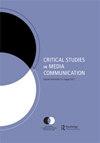Public goods and private interests: setting the table for the commercial internet in the 1990s
IF 1.5
2区 文学
Q3 COMMUNICATION
引用次数: 0
Abstract
ABSTRACT Today, U.S.-based corporations control much of the internet worldwide, but this was not always the case. During the administration of U.S. President Clinton (1993-2001), the U.S. Department of Commerce made deliberate efforts to support the development of a commercial internet. On the national and international stages, the U.S. Department of Commerce asserted its role as the manager of corporate interests, promoting internet governance structures that supported commerce while dampening efforts that might run counter to the goal of establishing a friendly environment for for-profit operators. Archival material tracing the administration's internet governance policy reveals consistent efforts to maximize the potential value of global electronic commerce and to minimize interference by other governmental and intergovernmental bodies. The Clinton administration's decisions related to management of internet structures were often consistent with previous patterns in laissez-faire approaches to media regulation that were themselves consistent with strategies for securing network control. While these patterns aligned with the neoliberal ideology of the time and with broader media history, the explicit attention that the Clinton administration paid to securing a role for private interests proved decisive in constituting the internet as a potential engine for commerce and as a means by which to effect network control.公共产品与私人利益:为20世纪90年代的商业互联网奠定基础
今天,总部位于美国的公司控制着全球大部分互联网,但情况并非一直如此。在克林顿总统执政期间(1993-2001),美国商务部为支持商业互联网的发展做出了慎重的努力。在国内和国际舞台上,美国商务部坚持其作为企业利益管理者的角色,促进支持商业的互联网治理结构,同时抑制可能与为营利性运营商建立友好环境的目标背道而驰的努力。追踪政府互联网治理政策的档案资料显示,政府一直在努力使全球电子商务的潜在价值最大化,并尽量减少其他政府和政府间机构的干扰。克林顿政府有关互联网结构管理的决定,往往与之前自由放任的媒体监管模式相一致,而这种模式本身与确保网络控制的战略是一致的。虽然这些模式与当时的新自由主义意识形态和更广泛的媒体历史相一致,但克林顿政府明确关注确保私人利益的作用,证明在将互联网构建为商业的潜在引擎和实现网络控制的手段方面具有决定性作用。
本文章由计算机程序翻译,如有差异,请以英文原文为准。
求助全文
约1分钟内获得全文
求助全文
来源期刊

Critical Studies in Media Communication
COMMUNICATION-
CiteScore
2.10
自引率
0.00%
发文量
34
期刊介绍:
Critical Studies in Media Communication (CSMC) is a peer-reviewed publication of the National Communication Association. CSMC publishes original scholarship in mediated and mass communication from a cultural studies and/or critical perspective. It particularly welcomes submissions that enrich debates among various critical traditions, methodological and analytical approaches, and theoretical standpoints. CSMC takes an inclusive view of media and welcomes scholarship on topics such as • media audiences • representations • institutions • digital technologies • social media • gaming • professional practices and ethics • production studies • media history • political economy. CSMC publishes scholarship about media audiences, representations, institutions, technologies, and professional practices. It includes work in history, political economy, critical philosophy, race and feminist theorizing, rhetorical and media criticism, and literary theory. It takes an inclusive view of media, including newspapers, magazines and other forms of print, cable, radio, television, film, and new media technologies such as the Internet.
 求助内容:
求助内容: 应助结果提醒方式:
应助结果提醒方式:


